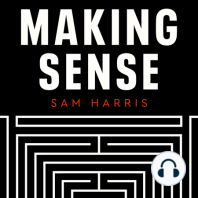8 min listen
#117 — Networks, Power, and Chaos
ratings:
Length:
41 minutes
Released:
Feb 19, 2018
Format:
Podcast episode
Description
In this episode of the Making Sense podcast, Sam Harris speaks with Niall Ferguson about his new book "The Square and the Tower." They discuss his career as a writer, networks and hierarchies, how history gets written, the similarity between the 16th century and the 21st, the role of social media in the 2016 Presidential election, the influence of advertising on the public sphere, Trump, the Russian investigation, Islamic extremism, counterfactuals, what would have happened if Clinton had won the presidency, immigration in Europe, conspiracy theories, capitalism, globalization, communism, wealth inequality, universal basic income, Henry Kissinger, the prospect of a US war with China, cyberwar, and other topics. You support the Making Sense podcast at SamHarris.org/subscribe.
Released:
Feb 19, 2018
Format:
Podcast episode
Titles in the series (100)
How to talk to a Christian: This is an edited excerpt from remarks that Sam H… by Making Sense with Sam Harris
